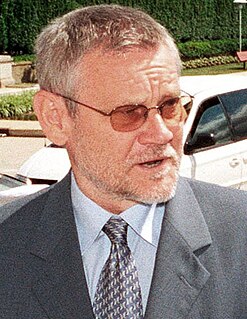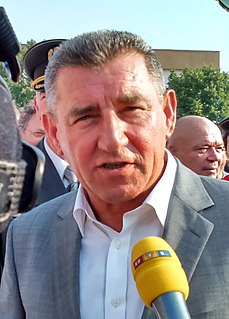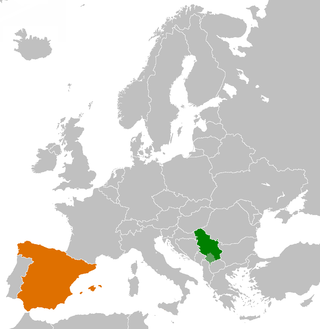
The prime minister of Croatia,officially the President of the Government of the Republic of Croatia,is Croatia's head of government,and is de facto the most powerful and influential state officeholder in the Croatian system of government. Following the first-time establishment of the office in 1945,the 1990–2000 semi-presidential period is the only exception where the president of Croatia held de facto executive authority. In the formal Croatian order of precedence,however,the position of prime minister is the third highest state office,after the president of the Republic and the speaker of the Parliament.

Ivica Račan was a Croatian politician who served as Prime Minister of Croatia from 2000 to 2003,heading two centre-left coalition governments.

Ivo Sanader is a former Croatian politician who served as Prime Minister of Croatia from 2003 to 2009.

The Social Democratic Party of Croatia is a social-democratic political party in Croatia and the largest party of the Croatian centre-left. The SDP is one of the two major political parties in Croatia,along with the centre-right Croatian Democratic Union (HDZ). The SDP is anti-fascist,progressive,and strongly pro-European. The SDP was formed in 1990 as the successor of the League of Communists of Croatia,Croatian branch of the League of Communists of Yugoslavia,which had governed Croatia within the Yugoslav federation since World War II.

Rahim Ademi is a retired Croatian Army general of Kosovar Albanian origin.

Ante Gotovina is a Croatian retired lieutenant general and former French senior corporal who served in the Croatian War for Independence. He is noted for his primary role in the 1995 Operation Storm. In 2001,the International Criminal Tribunal for the former Yugoslavia (ICTY) indicted him on war crimes and crimes against humanity charges in connection with that operation and its aftermath. After spending four years in hiding,he was captured in the Canary Islands in December 2005.

Ivica Dačić is a Serbian politician serving as the president of the National Assembly of Serbia since 2020 and as the leader of the Socialist Party of Serbia since 2003.

Ivica Olić is a Croatian professional football manager and former player who is an assistant coach of the Croatia national team.

Radimir Čačić is a Croatian politician and businessman who has been President of the People's Party –Reformists (NS-R) since the party's formation in 2014,as well as Prefect of Varaždin County since 2017.

The most recent enlargement of the European Union saw Croatia become the European Union's 28th member state on 1 July 2013. The country applied for EU membership in 2003,and the European Commission recommended making it an official candidate in early 2004. Candidate country status was granted to Croatia by the European Council in mid-2004. The entry negotiations,while originally set for March 2005,began in October that year together with the screening process.

Jozo Radoš is a Croatian liberal politician currently serving as one out of 11 Croatian members of the European Parliament. He previously served as a Minister of Defence,member of the Croatian Parliament and as an observer in the European Parliament for Croatia.

Anti-Terrorist Unit Lučko is the police tactical unit of the Croatian Police stationed in Lučko near Zagreb,the capital of Croatia. Initially distinguishing itself in the Croatian War of Independence,it has gone on to become Croatia's leading police tactical unit. Like all other police units in the country,it is under command of the Ministry of the Interior. It is a member of the ATLAS Network,an association of European police tactical units. Several of its members have gone on to achieve notability,including Croatian mixed martial arts fighter Mirko "Cro Cop" Filipović.
Mladen Markač is a Croatian retired general. He was a Commander of Croatian Special Police during Operation Storm during the Croatian War of Independence (1991–1995),and afterwards held the rank of Colonel General. Later,he was indicted by the International Criminal Tribunal for the Former Yugoslavia (ICTY) for war crimes committed during Operation Storm by Croatian forces against the Serbs from Croatia. In April 2011,the ICTY found him guilty and sentenced him to 18 years.

Serbian-Spanish relations are foreign relations between Serbia and Spain. Both countries established diplomatic relations on October 14,1916. Serbia has an embassy in Madrid. Spain has an embassy in Belgrade. Both countries are member states of the United Nations,Interpol,Council of Europe and Organization for Security and Co-operation in Europe. Spain is member state of the European Union since 1986 and Serbia is a candidate country since 2012 negotiating its future membership which Spain is strongly supporting. Spain is member state of NATO alliance while Serbia is a militarily neutral country with strong historical relations with the Non-Aligned Movement. In relation to third parties,both countries supported position of Argentina in its Falkland Islands sovereignty dispute with the United Kingdom in the past.
The Varivode massacre was a mass killing that occurred on 28 September 1995 in the village of Varivode,Croatia during the Croatian War of Independence. According to United Nations officials,soldiers of the Croatian Army (HV) and Croatian police killed nine Serb villagers,all of whom were between the ages of 60 and 85. After the war,six former Croatian soldiers were tried for committing crimes in the village,but were all eventually released due to lack of evidence. In 2012,the Supreme Court of Croatia ruled that the Republic of Croatia was responsible for the killings,dubbing the massacre an "act of terrorism," and the following year the municipal court in Knin announced that the Government of Croatia must provide compensation to the children of a couple who were murdered.
The Trial of Gotovina et al. was a war crimes trial held from March 2008 until November 2012 before the International Criminal Tribunal for the former Yugoslavia (ICTY),set up in 1993. The ICTY indicted Croatian Army (HV) generals Ante Gotovina,Ivan Čermak and Mladen Markačfor war crimes,specifically for their roles in Operation Storm,citing their participation in a joint criminal enterprise (JCE) aimed at the permanent removal of Serbs from the Republic of Serbian Krajina (RSK) held part of Croatia.
The Croatian Left has consisted of a broad range of individuals,groups,and political parties who seek egalitarian,economic,social and cultural rights in Croatia. Left wing ideologies came to Croatia in the late 19th century during the Austria-Hungary regime. In 1894,the Social Democratic Party of Croatia and Slavonia was formed. It was the first workers party in Croatia at the time. In the Kingdom of Serbs,Croats and Slovenes the leftist movement grew but it was suppressed by the royal government. In 1920,the Communist Party of Yugoslavia was proclaimed illegal and its sympathizers were brutally persecuted after winning a large number of positions in the local elections. During the 1920s,Stjepan Radićand his Croatian Peasant Party led a centre-left agrarianism and anty-royalist policy. They were the leading Croatian political party at the time. After the assassination of Radićin 1929,the Croatian Peasant Party was taken over by Vlatko Maček who enforced a more conservative and nationalist rhetoric. During the Socialist Yugoslavia era,the League of Communists of Yugoslavia was the only legal party in the country. In 1990,political plurality was restored and a number of left-wing parties emerged with the most notable one being the Social Democratic Party of Croatia.

Miroslav Šeparović is a Croatian lawyer who serves as the 5th President of the Constitutional Court of Croatia since 13 June 2016,had previously served as a 5th Minister of Justice in the Cabinet of Zlatko Mateša from 1995 to 1998.
The Gošićkllings refers to the mass murder of elderly Serb civilians from the village of Gošićin Šibenik-Knin County by members of the Croatian Army (HV) on 27 August 1995,approximately three weeks after Operation Storm.
The Grubori massacre was the mass murder of six Serb civilians from the village of Grubori,near Knin,on 25 August 1995 by members of the Croatian Army (HV) in the aftermath of Operation Storm. The massacre was listed in the ICTY's indictment of Croatian wartime generals Ante Gotovina,Ivan Čermak and Mladen Markač.
![]() listen ) (born 14 June 1970) is a Croatian politician who was the interior minister of Croatia from 2005 to 2008.
listen ) (born 14 June 1970) is a Croatian politician who was the interior minister of Croatia from 2005 to 2008.












